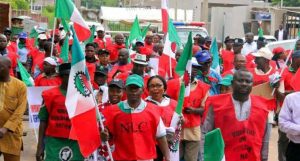Empty Threat? NLC Demands Immediate Fuel Price Reversal
The Nigeria Labour Congress (NLC) has issued a bold demand for the federal government to reverse the recent increase in fuel prices. This call comes amid growing frustration among Nigerians who are struggling with soaring living costs. The NLC’s stance raises questions about the government’s commitment to addressing economic challenges faced by ordinary citizens.
Understanding the Recent Fuel Price Hike
Recently, the Nigerian National Petroleum Company Limited (NNPCL) raised the price of petrol significantly. The price jumped from ₦897 to ₦1,030 per litre in Abuja, with similar increases reported in cities like Lagos. This marks a staggering 14.8% rise in just one month, translating to an increase of ₦133 per litre. In some areas, petrol prices have even reached as high as ₦1,200 per litre.
This latest hike is part of a troubling trend. Since May 29 of this year, petrol prices have surged by over 430%. Just last month, prices rose from an official rate of ₦617 to ₦897 per litre. Such rapid increases have left many consumers feeling overwhelmed and frustrated.
The Public’s Reaction
The public response has been swift and vocal. Many drivers and transporters have already begun raising their fares due to the increased fuel costs. For example, a trip from Lugbe to Wuse in Abuja has seen fares jump from ₦700 to ₦1,000. This spike in transportation costs adds further strain to households already grappling with inflation.
A customer at a local fuel station expressed their frustration: “I was shocked when I found out the price had gone up while I was waiting in line. I thought I was getting a better deal here.” This sentiment is shared by many Nigerians who feel blindsided by the sudden price increases.
NLC’s Strong Stance
The Nigeria Labour Congress has condemned these price hikes as unacceptable. In a statement signed by its president, Joe Ajaero, the union criticized the government for prioritizing fuel price increases without presenting a clear plan for economic stability and growth. Ajaero stated, “It is unreasonable that a private company (NNPCL) sets prices and acts like a monopoly.”
The union is calling for immediate action from the government to reverse these increases and provide a comprehensive economic strategy that addresses not just fuel pricing but also the broader issues affecting Nigerians’ daily lives.
The Government’s Response
As of now, the government has not directly responded to the NLC’s demands. However, it is evident that rising fuel prices lead to higher living costs, which could result in increased unrest among citizens already feeling financially strained.
This situation follows the end of an exclusive purchase agreement between NNPCL and Dangote Refinery, allowing other companies to buy products directly from Dangote. While this change aims at deregulation, it raises concerns about market stability and fairness in pricing.
The Broader Economic Impact
Fuel price hikes do not only affect transportation costs; they ripple through various sectors of the economy. Higher fuel prices can lead to increased costs for goods and services across the board. Small businesses, which often operate on thin margins, may struggle to absorb these costs and could be forced to raise prices or reduce staff.
For instance, food vendors who rely on transportation for supplies will likely pass on increased costs to consumers. This creates a cycle where everyone feels the pinch of higher prices, further exacerbating economic hardship for many families.
Looking Ahead
The call for an immediate reversal of pump prices by the Nigeria Labour Congress highlights widespread dissatisfaction among Nigerians facing escalating costs amid economic uncertainty. As petrol prices continue to rise sharply, it is crucial for both government officials and industry leaders to engage transparently with citizens about these pressing economic challenges.

The situation surrounding fuel prices in Nigeria remains tense as citizens await action from their government. The Nigeria Labour Congress’s demand for an immediate reversal reflects deep-seated concerns about affordability and economic stability. As discussions continue, it remains essential for all parties involved to prioritize solutions that benefit everyday Nigerians and foster a more stable economic environment.

